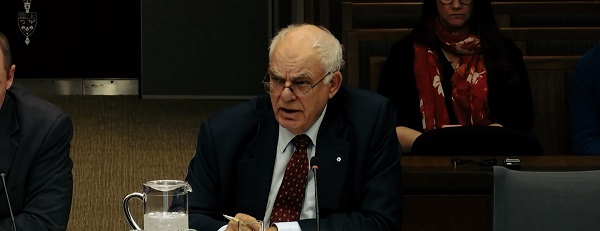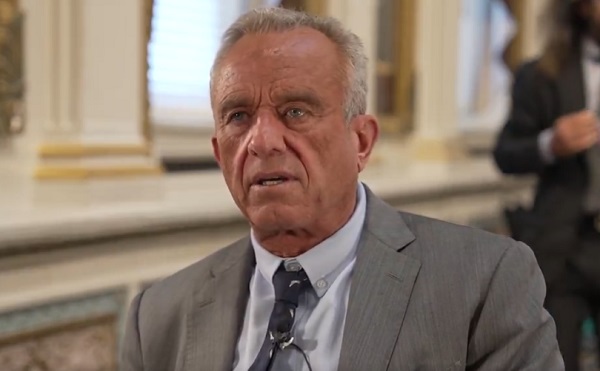Business
SDTC “Green” Fund or Trudeau’s Slush Fund? Public Accounts Committee Reveals Taxpayer Dollars Funneled to Liberal Insiders with No Accountability

Public Accounts Committee reveals SDTC’s rampant conflicts of interest, lack of oversight, and millions in taxpayer dollars benefiting insiders—while Liberal MPs defend Trudeau’s “green” slush fund.
What happens when politicians promise “green energy” but deliver taxpayer-funded corruption? If you tuned in to Canada’s Public Accounts Committee this week, you found out. On the hot seat was Sustainable Development Technology Canada (SDTC), a bloated agency supposedly designed to fund sustainable technology but apparently also set up as a welfare program for ethically dubious board members.
Now, SDTC isn’t some fledgling startup or small-time charity. This agency is sitting on $330 million of your money – Canadian taxpayer money. And what did Canada’s Auditor General find in her investigation? An unbelievable 186 conflicts of interest. That’s not an organization with a few bad apples; that’s a systematic problem.
So why isn’t anyone doing anything? Here’s where it gets even more outrageous. Enter Ethics Commissioner Konrad von Finkelstein, a man whose entire job is to hold officials accountable for ethical breaches. Did he step up to expose the corruption in SDTC? Not really. Von Finkelstein told the committee that his role is simply to “expose” conflicts of interest, not to actually do anything about them. Think about that. Here’s a man whose salary is funded by taxpayers, and his job description basically amounts to reading out loud the names of people breaking the rules.
Conservative MP Michael Cooper wasn’t having it. Cooper laid it out for von Finkelstein, practically begging him to explain why only two out of dozens of SDTC board members were investigated. But von Finkelstein’s excuse? He couldn’t bother because – get this – the Auditor General had already done the hard work. If that sounds like passing the buck, it’s because it is. Canadians aren’t paying for an Ethics Commissioner to sit back and watch. They’re paying for an official who’s supposed to defend the integrity of public institutions. But that’s clearly not happening here.
Liberal Apologists at Work
Not everyone on the committee wanted answers, though. Some were too busy defending SDTC’s “noble” cause. Liberal MP Nathaniel Erskine-Smith practically bent over backward trying to downplay the whole thing. When Conservative MPs called SDTC a “green slush fund,” Erskine-Smith got indignant. He insisted that SDTC wasn’t a criminal organization and took offense at the term “slush fund.” Really? Because if funneling millions of public dollars into the hands of connected board members isn’t a slush fund, I don’t know what is.
Let’s call it what it is. While Erskine-Smith was busy defending SDTC’s “mission,” the committee heard exactly how that mission was carried out – through unethical, undisclosed conflicts of interest, with board members giving funds to companies they had direct financial ties to. And what did Erskine-Smith call this? Just a “few ethical lapses,” as if millions of taxpayer dollars being handed out without oversight is a minor paperwork error.
The Ethics Commissioner’s Toothless Office
Bloc MP Nathalie Sinclair-Desgagné and NDP MP Richard Cannings pressed von Finkelstein on his office’s glaring lack of oversight. Why was he investigating just two board members when nearly 200 conflicts of interest were flagged? His answer was almost laughable: His office couldn’t enforce anything, couldn’t recoup the wasted money, and couldn’t even stop the bleeding of taxpayer funds because his role is “limited.” Limited? That’s putting it lightly.
And here’s where it gets even more insulting. Von Finkelstein admitted that he wouldn’t coordinate with other agencies like the RCMP or the Auditor General to go after these ethical lapses. This office, which exists solely to enforce ethical standards, can’t or won’t go after those breaking them. It’s as if the Ethics Commissioner’s job is to stand back and announce that something unethical happened, only to shrug and do nothing about it. Can you imagine running any organization that way? Of course not – but in the Canadian government, this seems to be the new normal.
Auditor Testifies, and It’s Worse Than We Thought
Just when we thought the Ethics Commissioner’s testimony had exposed the worst of Canada’s green-tech “accountability” disaster, along comes Auditor General official Michel Bédard. You’d think with the staggering amount of taxpayer money SDTC has under its control, someone would be keeping tabs. But if today’s testimony proved anything, it’s that this agency has zero meaningful oversight, a culture that actively ignores conflicts of interest, and no one stepping in to protect Canadians’ hard-earned money.
So, here we go again. 186 conflicts of interest, millions in public funds granted to companies with ties to board members—SDTC is basically the Wild West of “green” government spending. And guess what? Just like the Ethics Commissioner, Bédard’s office can report on it, but he admitted they can’t actually do anything to stop it. All that money might as well be floating in a pool, with insiders diving in for their share.
The “Accountability” Problem: Michael Cooper’s Pointed Questions
Conservative MP Michael Cooper wasn’t here to play around. He honed in on the obvious question: if SDTC’s board members aren’t held accountable, what’s the point of an Auditor General report? Cooper pushed Bédard to explain why these SDTC board members weren’t facing any real consequences. Bédard’s response? His office doesn’t have the authority to penalize or recover funds—it’s all just for show. That’s the message, folks: this is a government program that “monitors” ethical breaches but has no teeth.
If you’re wondering why SDTC board members feel free to treat taxpayers’ dollars like a bottomless well, this is it. They know that nothing’s going to happen. Cooper hit the nail on the head when he called out the lack of deterrence, and Canadians ought to be asking: why are we funding oversight bodies that can’t actually hold people accountable?
Liberals Try to Soften the Blow—Iqra Khalid’s Flimsy Defense
Then, enter Liberal MP Iqra Khalid, swooping in with damage control. Her goal? To downplay this mess as if it’s all just a big misunderstanding. She floated the idea that SDTC’s ethical violations weren’t “intentional misconduct” but simply lapses in judgment, suggesting board members maybe didn’t “understand” conflict-of-interest rules. Are we supposed to believe that these seasoned board members—handling millions in taxpayer funds—just forgot their ethics training?
Khalid hinted that more “training” and “internal guidance” would fix things. Bédard’s subtle response was telling: yes, training is helpful, but let’s be clear, SDTC’s issues are deeper. It’s a cultural problem within an organization that has no incentive to follow the rules. Training can’t fix a system that fundamentally disregards ethical standards. Khalid’s attempt to sidestep accountability only underscored what’s really happening here—a refusal to impose consequences.
Nathalie Sinclair-Desgagné and Richard Cannings: Why Aren’t Taxpayers Being Compensated?
Bloc Québécois MP Nathalie Sinclair-Desgagné and NDP MP Richard Cannings brought up the most glaring issue yet: where’s the money? Taxpayers are funding SDTC, watching it go straight into the hands of conflicted board members, and yet, there’s no mechanism to get that money back. Sinclair-Desgagné demanded answers on why SDTC couldn’t recoup funds that were misappropriated due to these ethical lapses. Bédard’s response? The Auditor General’s office has no authority to force financial recovery, meaning SDTC’s board can make conflicted decisions with no risk of losing the cash.
Cannings and Sinclair-Desgagné went further, questioning whether anything less than legislative reform could solve this crisis. It was clear that these MPs understood the root of the problem: SDTC’s oversight is built on a house of cards, with taxpayer money at stake and no tools to hold anyone accountable. Canadians are effectively writing blank checks to a board of insiders who profit without consequences.
The Big Picture: A Culture of Entitlement and Zero Accountability
Michel Bédard’s testimony laid bare the sickening entitlement within SDTC’s leadership. This isn’t a minor oversight or an accidental misunderstanding—this is a systemic culture where people with a financial stake in the projects can vote themselves money, and no one bats an eye. Worse, the Liberal defense of SDTC is that because it has a “green mission,” its failures somehow don’t matter. They’re telling Canadians that as long as the organization’s purpose sounds virtuous, the rules don’t apply.
Let’s be real. No one believes that SDTC’s board members are unaware of basic ethics rules. These are people who sit in decision-making positions, who know full well the implications of conflict of interest. What’s happened here is that they’re taking advantage of a system that has no means of holding them accountable, and they know it.
What Canada Needs Now, Real Accountability, Not Empty Promises
The real takeaway from Bédard’s testimony? Canada’s so-called oversight framework is a farce. The Trudeau government has set up an accountability structure that looks good on paper but doesn’t stop the political class from dipping their hands in taxpayer money. If we want to see real change, Canadians need a complete overhaul of the system—one that actually empowers the Auditor General and Ethics Commissioner to take action and enforce consequences, not just to “report” and move on. Until that happens, SDTC will keep doing what it does best: functioning as a de facto slush fund for Trudeau’s elite insiders, where conflicts of interest are not exceptions but the rule.
Canadians deserve far better than a government handing out their tax dollars to political friends who think they’re untouchable. Michel Bédard’s testimony laid bare SDTC’s blatant failures, and it’s a moment of reckoning. Will any of these politicians rise above the corruption and demand real reform? Or will this testimony be just another chapter in the Trudeau government’s long saga of accountability failures?
Let’s get one thing straight: this isn’t about “green energy” or “sustainability.” Those are just fancy words bureaucrats use while they funnel public money to friends and business associates without a shred of oversight. And here’s the kicker—Liberal MPs want Canadians to think this is just a “misunderstanding” or, worse, that questioning it is somehow unpatriotic. It’s the Trudeau swamp at its finest: shut down accountability by slapping a green label on taxpayer-funded corruption and hoping no one notices.
Let’s face it: Sustainable Development Technology Canada isn’t operating in some dark corner of bureaucracy. It’s operating right out in the open, with the full backing of Trudeau’s government, while the Ethics Commissioner, the Auditor General, and Liberal MPs play the role of political apologists, doing everything they can to sweep this rot under the rug.
This committee session showed Canadians one thing loud and clear: they’re being lied to. Told that their money is supporting green technology, but instead, it’s being pocketed by insiders. SDTC, the Ethics Commissioner, the Auditor General—they’re not protecting Canadians. They’re protecting the interests of a political class that’s putting cronyism above the public good.
In a fair system, people would lose their jobs over this. Taxpayer money would be repaid. And those who let SDTC slip through the cracks would face consequences. But in Trudeau’s Canada, officials hide behind excuses, Ethics Commissioners wring their hands about “exposure,” and Liberal MPs get offended when we dare call corruption for what it is.
This isn’t “oversight.” It’s an insult to every Canadian who funds this government. It’s time to drain the Trudeau swamp, end the era of unchecked cronyism, and demand real, accountable governance. Canadians deserve nothing less.
Subscribe to The Opposition with Dan Knight .
Business
Cuba has lost 24% of it’s population to emigration in the last 4 years

 MxM News
MxM News
Quick Hit:
A new study finds Cuba has lost nearly a quarter of its population since 2020, driven by economic collapse and a mass emigration wave unseen outside of war zones. The country’s population now stands at just over 8 million, down from nearly 10 million.
Key Details:
- Independent study estimates Cuba’s population at 8.02 million—down 24% in four years.
- Over 545,000 Cubans left the island in 2024 alone—double the official government figure.
- Demographer warns the crisis mirrors depopulation seen only in wartime, calling it a “systemic collapse.”
Diving Deeper:
Cuba is undergoing a staggering demographic collapse, losing nearly one in four residents over the past four years, according to a new study by economist and demographer Juan Carlos Albizu-Campos. The report estimates that by the end of 2024, Cuba’s population will stand at just over 8 million people—down from nearly 10 million—a 24% drop that Albizu-Campos says is comparable only to what is seen in war-torn nations.
The study, accessed by the Spanish news agency EFE, points to mass emigration as the primary driver. In 2024 alone, 545,011 Cubans are believed to have left the island. That number is more than double what the regime officially acknowledges, as Cuba’s government only counts those heading to the United States, ignoring large flows to destinations like Mexico, Spain, Serbia, and Uruguay.
Albizu-Campos describes the trend as “demographic emptying,” driven by what he calls a “quasi-permanent polycrisis” in Cuba—an interwoven web of political repression, economic freefall, and social decay. For years, Cubans have faced food and medicine shortages, blackout-plagued days, fuel scarcity, soaring inflation, and a broken currency system. The result has been not just migration, but a desperate stampede for the exits.
Yet, the regime continues to minimize the damage. Official figures from the National Office of Statistics and Information (ONEI) put Cuba’s population at just over 10 million in 2023. However, even those numbers acknowledge a shrinking population and the lowest birth rate in decades—confirming the crisis, if not its full scale.
Cuba hasn’t held a census since 2012. The last scheduled one in 2022 has been repeatedly delayed, allegedly due to lack of resources. Experts doubt that any new attempt will be transparent or complete.
Albizu-Campos warns that the government’s refusal to confront the reality of the collapse is obstructing any chance at solutions. More than just a demographic issue, the study describes Cuba’s situation as a “systemic crisis.”
“Havana (Cuba, February 2023)” by Bruno Rijsman licensed under CC BY-SA 2.0 DEED.
Business
Tariff-driven increase of U.S. manufacturing investment would face dearth of workers

From the Fraser Institute
Since 2015, the number of American manufacturing jobs has actually risen modestly. However, as a share of total U.S. employment, manufacturing has dropped from 30 per cent in the 1970s to around 8 per cent in 2024.
Donald Trump has long been convinced that the United States must revitalize its manufacturing sector, having—unwisely, in his view—allowed other countries to sell all manner of foreign-produced manufactured goods in the giant American market. As president, he’s moved quickly to shift the U.S. away from its previous embrace of liberal trade and open markets as cornerstones of its approach to international economic policy —wielding tariffs as his key policy instrument. Since taking office barely two months ago, President Trump has implemented a series of tariff hikes aimed at China and foreign producers of steel and aluminum—important categories of traded manufactured goods—and threatened to impose steep tariffs on most U.S. imports from Canada, Mexico and the European Union. In addition, he’s pledged to levy separate tariffs on imports of automobiles, semi-conductors, lumber, and pharmaceuticals, among other manufactured goods.
In the third week of March, the White House issued a flurry of news releases touting the administration’s commitment to “position the U.S. as a global superpower in manufacturing” and listing substantial new investments planned by multinational enterprises involved in manufacturing. Some of these appear to contemplate relocating manufacturing production in other jurisdictions to the U.S., while others promise new “greenfield” investments in a variety of manufacturing industries.
President Trump’s intense focus on manufacturing is shared by a large slice of America’s political class, spanning both of the main political parties. Yet American manufacturing has hardly withered away in the last few decades. The value of U.S. manufacturing “output” has continued to climb, reaching almost $3 trillion last year (equal to 10 per cent of total GDP). The U.S. still accounts for 15 per cent of global manufacturing production, measured in value-added terms. In fact, among the 10 largest manufacturing countries, it ranks second in manufacturing value-added on a per-capita basis. True, China has become the world’s biggest manufacturing country, representing about 30 per cent of global output. And the heavy reliance of Western economies on China in some segments of manufacturing does give rise to legitimate national security concerns. But the bulk of international trade in manufactured products does not involve goods or technologies that are particularly critical to national security, even if President Trump claims otherwise. Moreover, in the case of the U.S., a majority of two-way trade in manufacturing still takes place with other advanced Western economies (and Mexico).
In the U.S. political arena, much of the debate over manufacturing centres on jobs. And there’s no doubt that employment in the sector has fallen markedly over time, particularly from the early 1990s to the mid-2010s (see table below). Since 2015, the number of American manufacturing jobs has actually risen modestly. However, as a share of total U.S. employment, manufacturing has dropped from 30 per cent in the 1970s to around 8 per cent in 2024.
| U.S. Manufacturing Employment, Select Years (000)* | |
|---|---|
| 1990 | 17,395 |
| 2005 | 14,189 |
| 2010 | 14,444 |
| 2015 | 12,333 |
| 2022 | 12,889 |
| 2024 | 12,760 |
| *December for each year shown. Source: U.S. Bureau of Labor Statistics | |
Economists who have studied the trend conclude that the main factors behind the decline of manufacturing employment include continuous automation, significant gains in productivity across much of the sector, and shifts in aggregate demand and consumption away from goods and toward services. Trade policy has also played a part, notably China’s entry into the World Trade Organization (WTO) in 2001 and the subsequent dramatic expansion of its role in global manufacturing supply chains.
Contrary to what President Trump suggests, manufacturing’s shrinking place in the overall economy is not a uniquely American phenomenon. As Harvard economist Robert Lawrence recently observed “the employment share of manufacturing is declining in mature economies regardless of their overall industrial policy approaches. The trend is apparent both in economies that have adopted free-market policies… and in those with interventionist policies… All of the evidence points to deep and powerful forces that drive the long-term decline in manufacturing’s share of jobs and GDP as countries become richer.”
This brings us back to the president’s seeming determination to rapidly ramp up manufacturing investment and production as a core element of his “America First” program. An important issue overlooked by the administration is where to find the workers to staff a resurgent U.S. manufacturing sector. For while manufacturing has become a notably “capital-intensive” part of the U.S. economy, workers are still needed. And today, it’s hard to see where they will be found. This is especially true given the Trump administration’s well-advertised skepticism about the benefits of immigration.
According to the U.S. Bureau of Labor Statistics, the current unemployment rate across America’s manufacturing industries collectively stands at a record low 2.9 per cent, well below the economy-wide rate of 4.5 per cent. In a recent survey by the National Association of Manufacturers, almost 70 per cent of American manufacturers cited the inability to attract and retain qualified employees as the number one barrier to business growth. A cursory look at the leading industry trade journals confirms that skill and talent shortages remain persistent in many parts of U.S. manufacturing—and that shortages are destined to get worse amid the expected significant jump in manufacturing investment being sought by the Trump administration.
As often seems to be the case with Trump’s stated policy objectives, the math surrounding his manufacturing agenda doesn’t add up. Manufacturing in America is in far better shape than the president acknowledges. And a tariff-driven avalanche of manufacturing investment—should one occur—will soon find the sector reeling from an unprecedented human resource crisis.
Jock Finlayson
Senior Fellow, Fraser Institut
-

 Uncategorized12 hours ago
Uncategorized12 hours agoPoilievre on 2025 Election Interference – Carney sill hasn’t fired Liberal MP in Chinese election interference scandal
-

 Business22 hours ago
Business22 hours agoCuba has lost 24% of it’s population to emigration in the last 4 years
-

 Business2 days ago
Business2 days agoLabor Department cancels “America Last” spending spree spanning five continents
-

 2025 Federal Election2 days ago
2025 Federal Election2 days agoCanadian Banks Tied to Chinese Fentanyl Laundering Risk U.S. Treasury Sanctions After Cartel Terror Designation
-

 Health2 days ago
Health2 days agoRFK Jr. says ‘everything is going to change’ with CDC vaccine policy in Michael Knowles interview
-

 Automotive2 days ago
Automotive2 days agoTrump warns U.S. automakers: Do not raise prices in response to tariffs
-

 2025 Federal Election2 days ago
2025 Federal Election2 days agoNext federal government should recognize Alberta’s important role in the federation
-

 Business1 day ago
Business1 day agoTariff-driven increase of U.S. manufacturing investment would face dearth of workers









